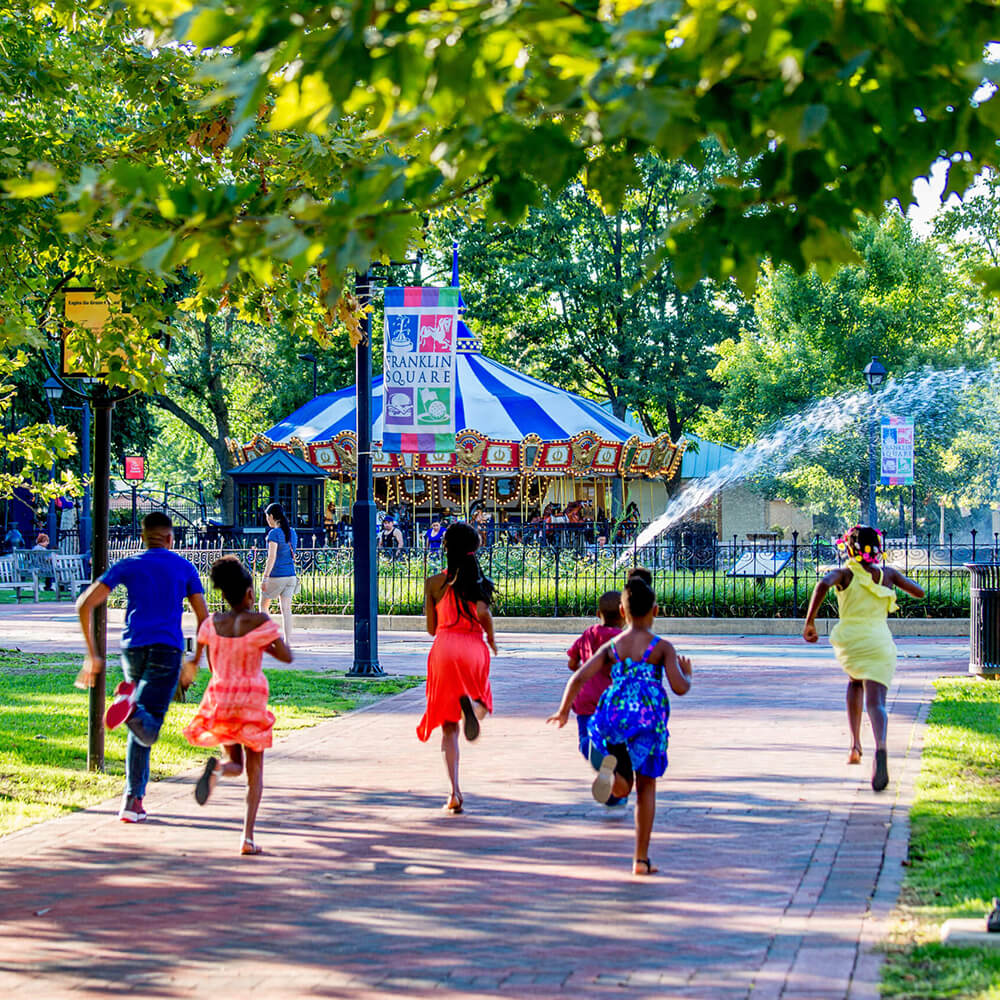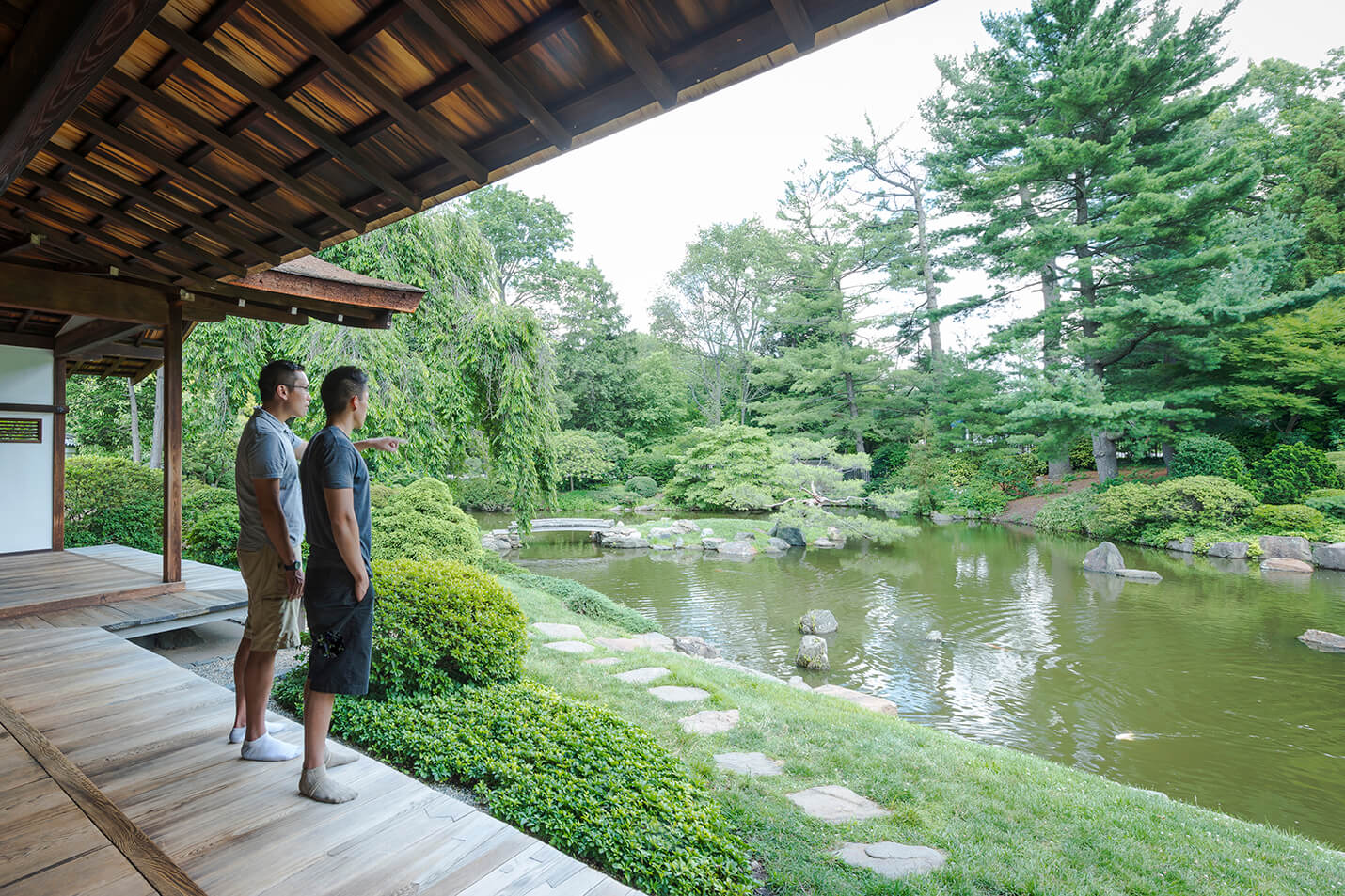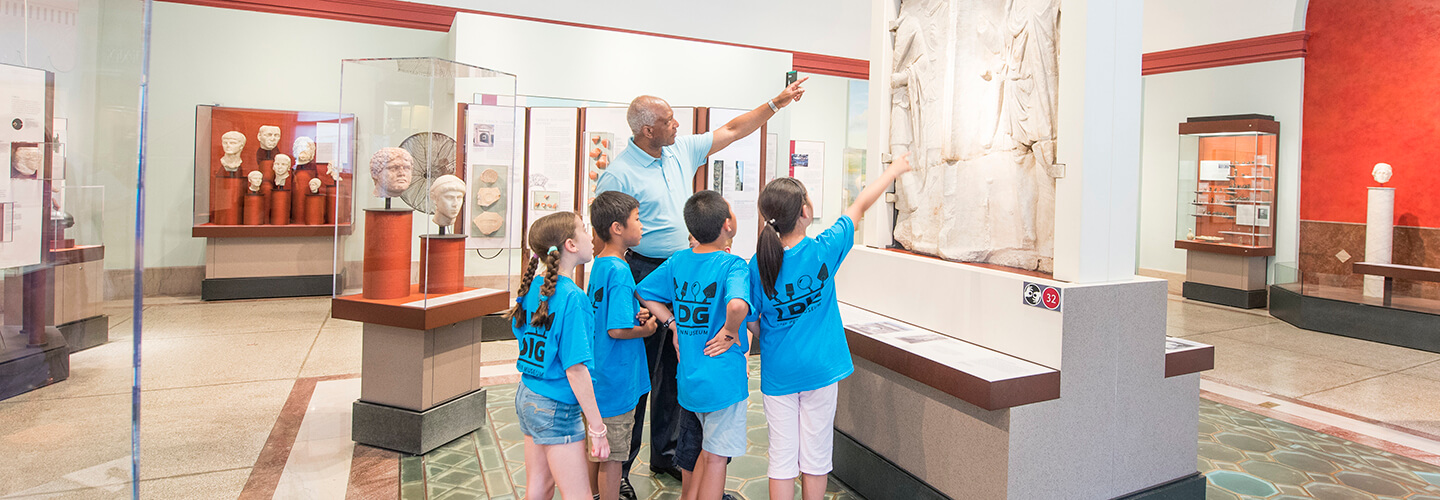The Universal Sphere at the Comcast Technology Center is a free, immersive dome theater offering a unique cinematic experience from Steve Spielberg. Open year-round, visitors can enjoy this unique experience at no cost by reserving a spot online or in person during operating hours.
Date
March 13, 2025
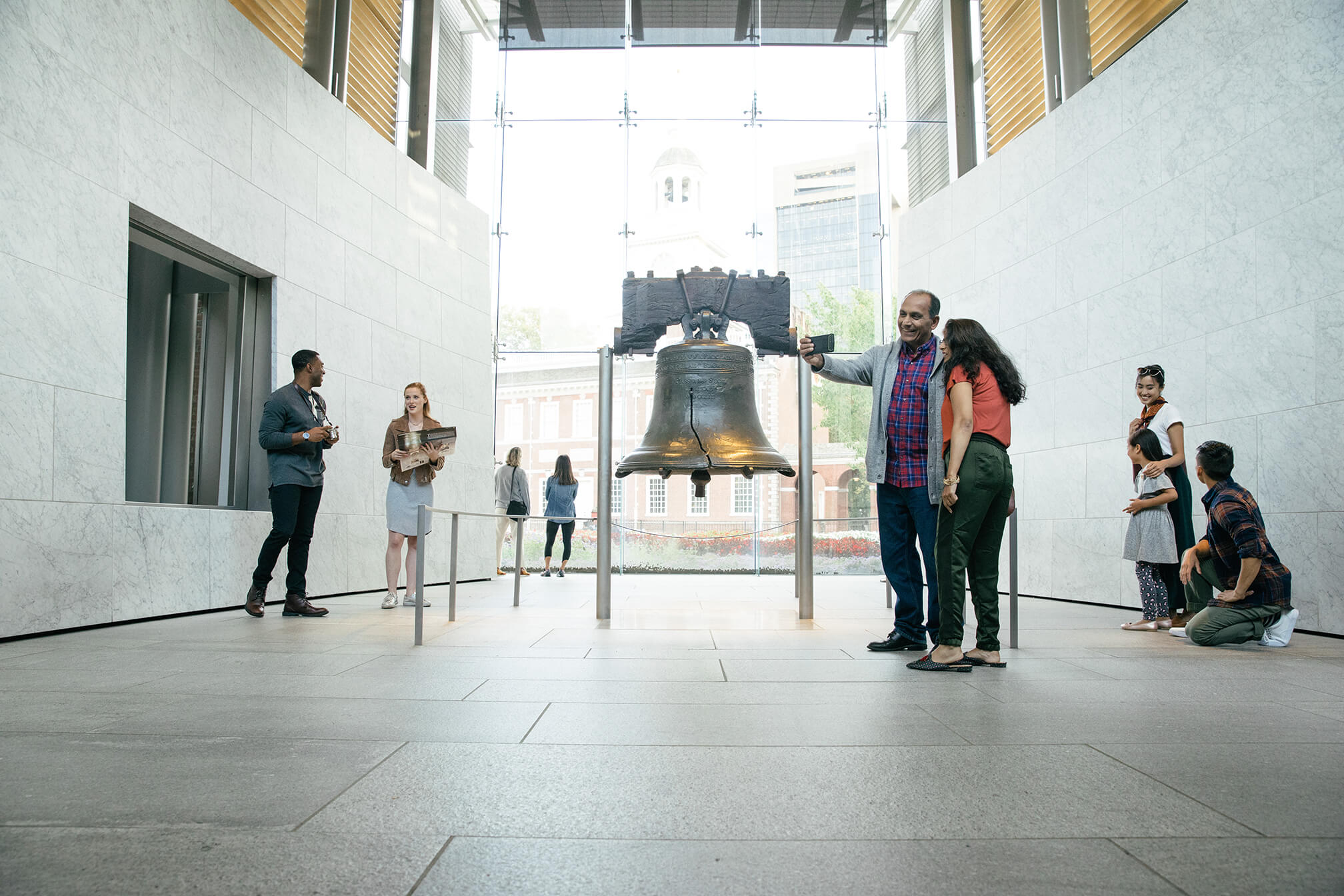
Whether it’s a visit to free historical sites, a picnic in one of the city’s beautiful parks, or a closer look at the landmark Mural Arts program, Philadelphia has plenty of free things to do.
As Ben Franklin said, “A penny saved is two pence clear.” To save some pennies, check out these budget-friendly and free things to do in Philadelphia.
Free Historical Activities
Philadelphia is the city that helped launch a nation, and there are plenty of ways to engage in its historical significance.
1. Independence National Historical Park
Start at the city’s official welcome center Independence Visitor Center, in the heart of Philadelphia’s historic square-mile. Multilingual visitor services representatives are available to assist with any trip-planning needs, including on-site ticketing for more than 100 tours and attractions. Stop in for free amenities, including regional maps and brochures, historical films, cell phone charging stations, and Wi-Fi access.
Must-sees include Independence Hall, the building where the Declaration of Independence and U.S. Constitution were debated and adopted. Tickets for a viewing can be purchased ahead of time for only $1. Also tour Congress Hall, where George Washington was inaugurated as the first President of the United States.
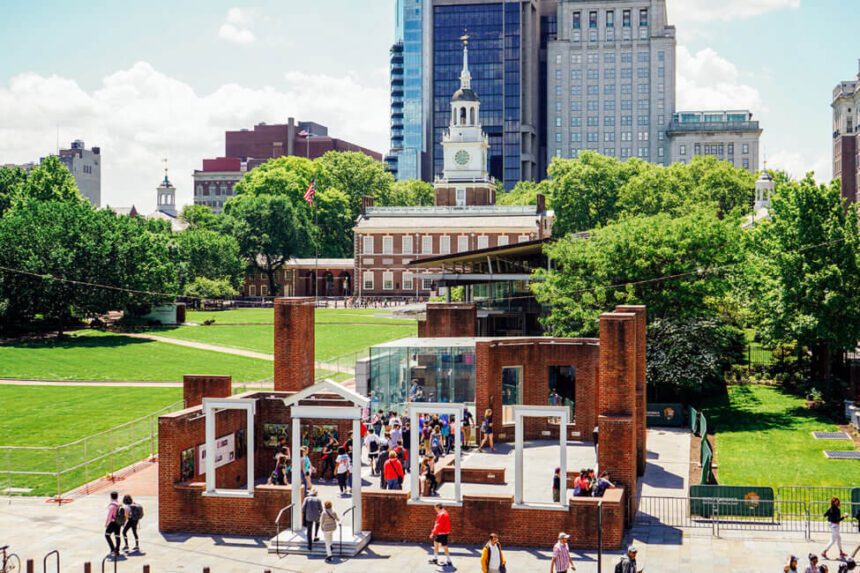
Independence Hall, the Liberty Bell Center and the President’s House Historic Site are all free experiences available in Independence National Historical Park. Photo by K. Huff for PHLCVB.
2. The Liberty Bell
The Liberty Bell is the symbol of Philadelphia’s historic past, on display in the Liberty Bell Center. Tickets are not required, and access is available daily on a first-come, first-served basis. A walk through the museum provides the history of the famous bell and an up close look.
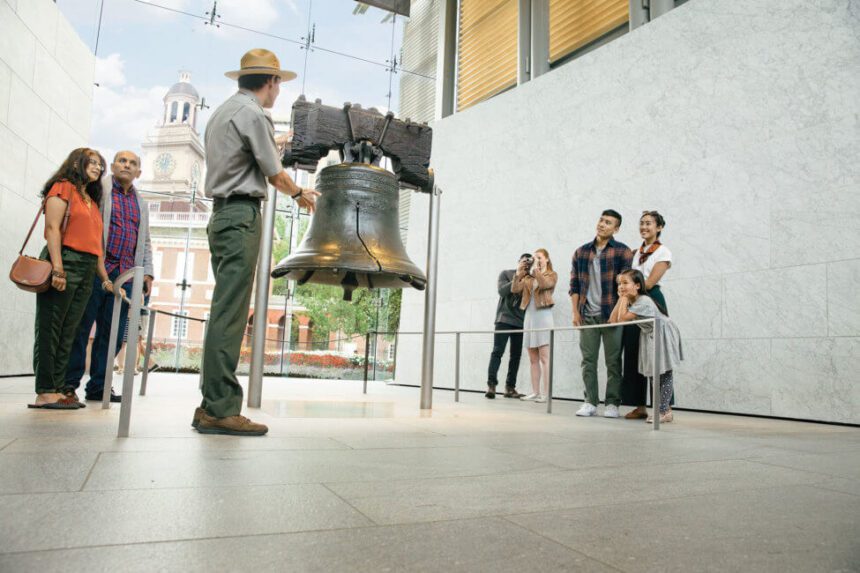
The Liberty Bell is free to visit and housed within the Liberty Bell Center in Independence National Historical Park. Photo by M. Zugale for PHLCVB.
3. The President’s House
Before the establishment of Washington D.C., Philadelphia was once the capital of the United States. Head to the President’s House, the executive mansion of George Washington and John Adams, to see where the commander in chiefs once lived. While there, explore the “Freedom and Slavery in the Making of a New Nation” exhibit, paying homage to nine documented people who were enslaved in the Washington household.
4. Carpenters’ Hall
Carpenters’ Hall was the site of the First Continental Congress in 1774, and later a temporary field hospital during the Revolutionary War. Step back into the past with a free tour of this building.
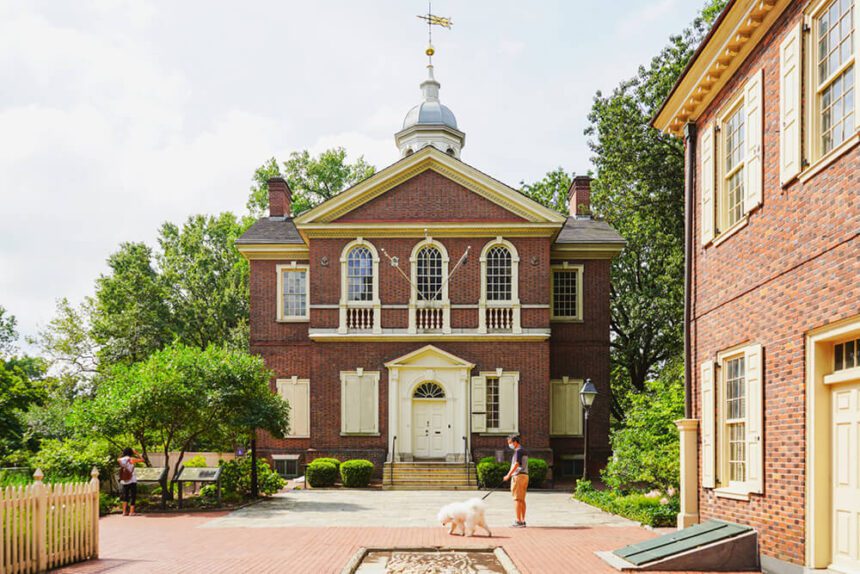
Carpenters’ Hall is another free-to-visit historic site within Independence National Historical Park. Photo by K. Huff for PHLCVB.
5. Once Upon a Nation Storytelling Benches
Join storytellers seasonally at eight unique benches in Philadelphia’s historic district. They will share fascinating stories of the nation’s history while visitors can relax on the benches.
6. Elfreth’s Alley
Tucked away from Old City’s vibrant streets is America’s oldest continuously inhabited residential street, Elfreth’s Alley. Enjoy the beautifully preserved homes and walk the cobblestone streets to see what life was like for early American settlers.
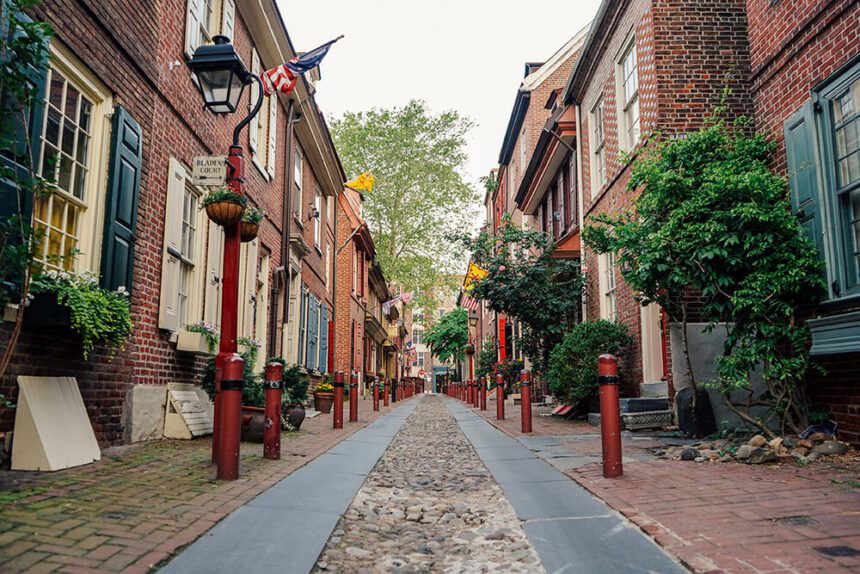
Explore Elfreth’s Alley, the oldest continuously inhabited residential street in the nation, for free, in Philadelphia’s Old City. Photo by K. Huff for PHLCVB.
7. Fireman’s Hall
Philadelphia is the birthplace of the first volunteer fire company, created in 1736 by Benjamin Franklin. Fireman’s Hall is a unique museum dedicated to the preservation of Philly fire history and promoting fire safety. It is located only a few blocks from Elfreth’s Alley.
8. Christ Church
In the heart of Philadelphia’s Old City, you can stand in the same church where the Founders worshipped. Christ Church’s Burial Grounds are located nearby at 5th and Arch Streets and are the final resting place of Benjamin Franklin. Paid admission is required for the Burial Grounds. However, you can catch a glimpse of Benjamin Franklin’s gravesite through a steel fence along Arch Street.
9. Weitzman National Museum of American Jewish History
The Weitzman National Museum of American Jewish History is a free museum detailing the Jewish experience in America starting in 1654. The first floor features the “Only in America” gallery — an exhibition illustrating the choices, challenges, and opportunities Jewish Americans encountered in America.
10. The American Philosophical Society
The American Philosophical Society Museum is the oldest learned society in the United States, founded in 1743 by Benjamin Franklin to “promote useful knowledge.” Inside this Old City museum, visitors can see their collection of manuscripts, rare books, photographs, and more.
11. The United States Mint
Visit the United States Mint for a free, self-guided tour featuring a view of coining operations 40 feet above the factory floor. Reservations are not required for the tour, which is available to the public Monday through Friday.
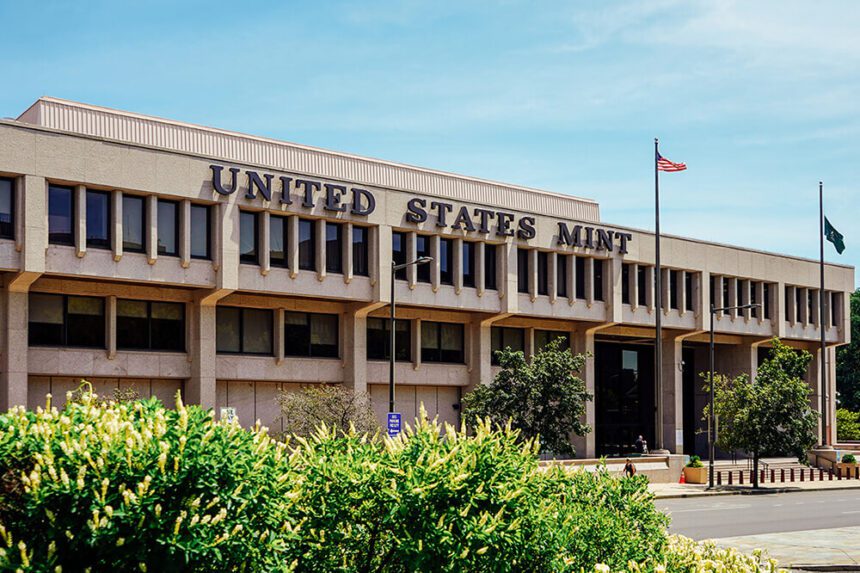
Enjoy a free tour of the U.S. Mint in Philadelphia for a behind-the-scenes look at the coin-making process. Photo by K. Huff for PHLCVB.
12. Mother Bethel A.M.E. Church
Founded by Richard Allen in 1792, Mother Bethel A.M.E. Church is the oldest piece of property continuously owned by African Americans. A small museum is located on the lower level, where the tomb of Richard Allen and 19th-century artifacts also can be found. The archives contain original copies of The Christian Recorder, a newspaper that began publishing before the Civil War.
Free Things to Do Outdoor
Philadelphia boasts an expansive network of trails, riverfronts, and outdoor activities within one of the world’s most extensive city-owned urban park systems.
1. Philadelphia’s Original Squares
William Penn’s original city plan for Philadelphia included five public squares. Today, you can visit Philadelphia’s picturesque squares, including Rittenhouse Square, Washington Square, Franklin Square, and Logan Square. The fifth square is home to City Hall, known as Dilworth Park. Walk to the center courtyard of City Hall to see a map of all five squares and then enjoy Dilworth Park’s refreshments and seasonal activities.
2. LOVE Park
Head to LOVE Park for a photo op with the LOVE statue. The park features a clear view of the Benjamin Franklin Parkway as it runs toward the Philadelphia Museum of Art. LOVE Park also offers plenty of seating, frequent food trucks, and seasonal activities. Be sure to visit the Visitor Center kiosk to shop for souvenirs, acquire visitor information, and purchase tickets for attractions.
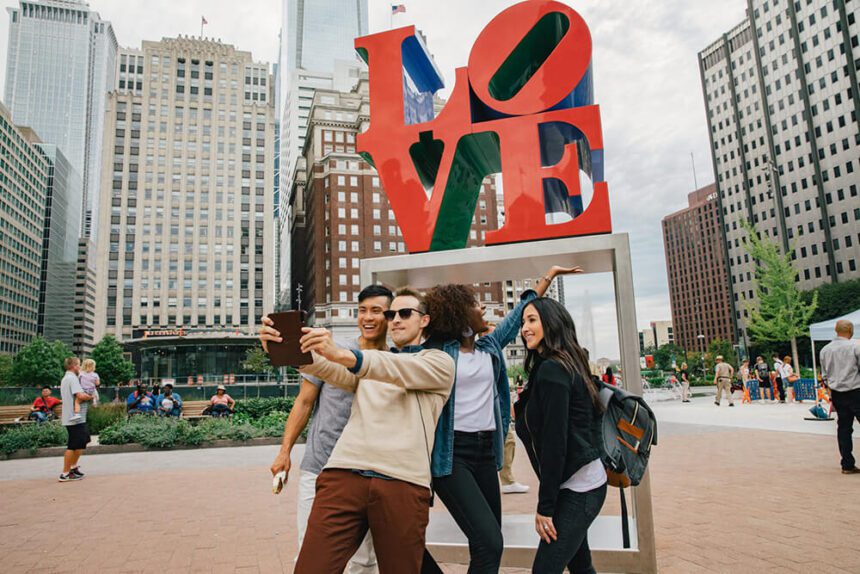
Robert Indiana’s iconic ‘LOVE’ sculpture is one of Philadelphia’s most photo-worthy pieces of public art. Photo by M. Zugale for PHLCVB.
3. Fairmount Park
Bike or hike in Fairmount Park on more than 270 miles of recreational trails. The expansive park system provides endless outdoor opportunities to escape into nature. The park connects with the greenways of the Schuylkill Banks, which features a 2,000-foot-long pathway that hovers over the Schuylkill River for walking, running, or bicycling.
4. Smith Memorial Playground
Within Fairmount Park, you can find one of the oldest playgrounds in America—with one of the biggest wooden slides. Smith Memorial Playground is over 100 years old and features a giant playhouse, over 50 pieces of unique play equipment, and the historic Ann Newman Giant Wooden Slide.
5. Bartram’s Garden
Bartram’s Garden, America’s first botanical garden, spans over 45 acres along the Schuylkill River. This off-the-beaten-path gem includes trails, historical buildings, educational programming, and a boat launch.
6. Spruce Street Harbor Park
Relax in a hammock or enjoy the river breeze at the seasonal Spruce Street Harbor Park. Situated atop several floating barges, this park features plenty of seating and lounge spaces, food vendors, and more. At night, the LED light installations glow beautifully along the Delaware River Waterfront.
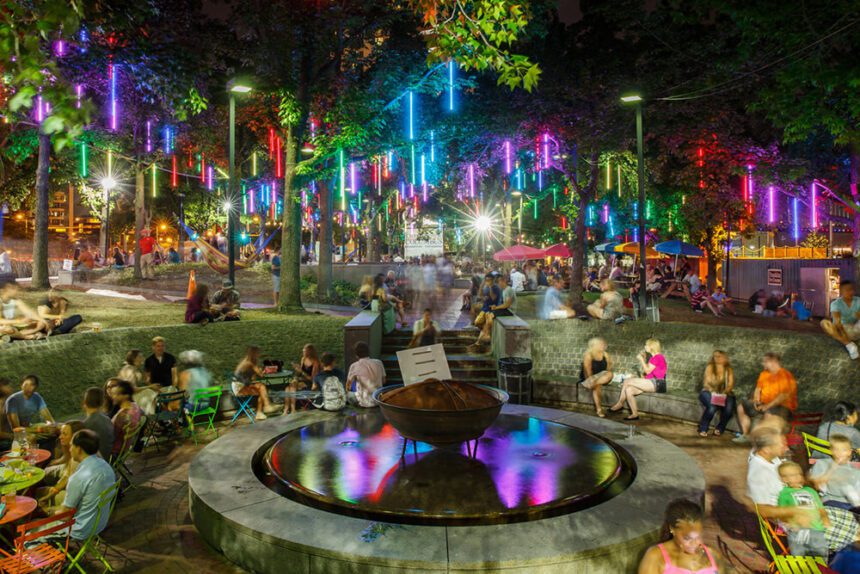
Spruce Street Harbor Park is just one of the many free outdoor experiences found along the Delaware River waterfront. Photo by M. Stanley.
7. Cherry Street Pier
Cherry Street Pier is a redeveloped, century-old municipal pier that offers year-round performances, pop-up shops, food vendors and more. The pier’s open-air section on the eastern end is home to the Garden pop-up dining experience. Tables can be reserved online to enjoy food and drink while admiring breathtaking views of the Delaware River.
8. Race Street Pier
Just north of Cherry Street Pier, Race Street Pier is a multi-level recreational pier popular among runners. The pier also features lawns, perfect for riverside picnics. Enjoy stunning views beneath the Benjamin Franklin Bridge as ships sail by along the Delaware River.
9. The Rail Park
Swing on a bench and walk the paths of The Rail Park, built on unused rail lines that have been transformed into a beautiful public space. Head to nearby Chinatown for a bite to eat or a sweet treat afterward.
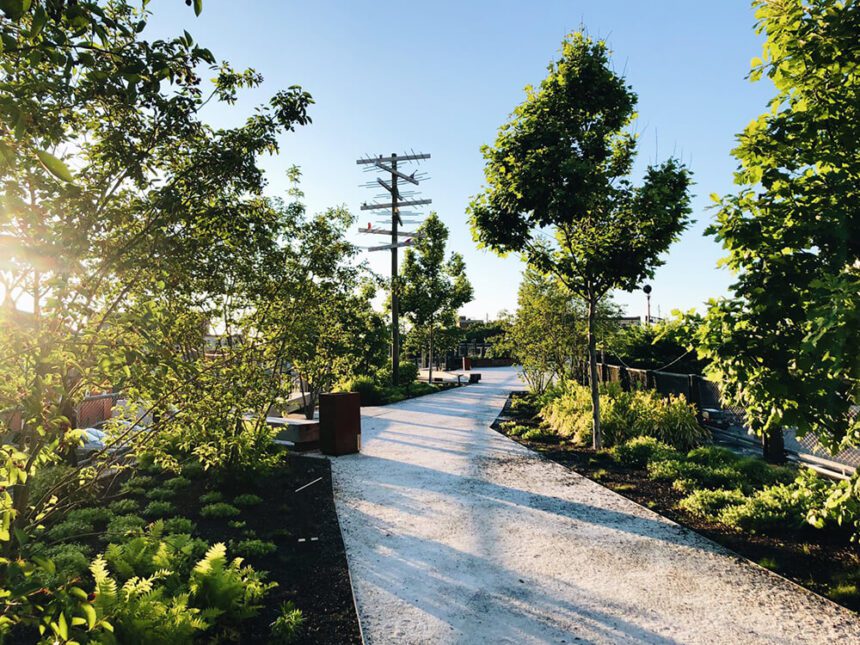
The Rail Park is an elevated green space located just a short walk north from Chinatown and the Pennsylvania Convention Center. Photo by M. Smith.
10. Cira Green
Located 12 stories up and on top of a West Philadelphia parking garage, Cira Green is a park in the sky. The park hosts events like movie nights and yoga classes in warmer months. Or come by with a group and enjoy local fare and an ice-cold cocktail.
Free & Budget Friendly Arts and Culture Activities
Home to over 4,000 murals and world-class museums, Philadelphia surrounds visitors with art. Explore these free artistic activities in Philadelphia.
1. Self-Guided Public Art Tours
Enjoy self-guided tours of Philadelphia’s exceptional collection of public art with digital maps offered by Mural Arts Philadelphia and the Association for Public Art. With thousands of murals and treasured sculptures throughout the city, these self-guided experiences are a great way to discover Philadelphia’s walkable communities.
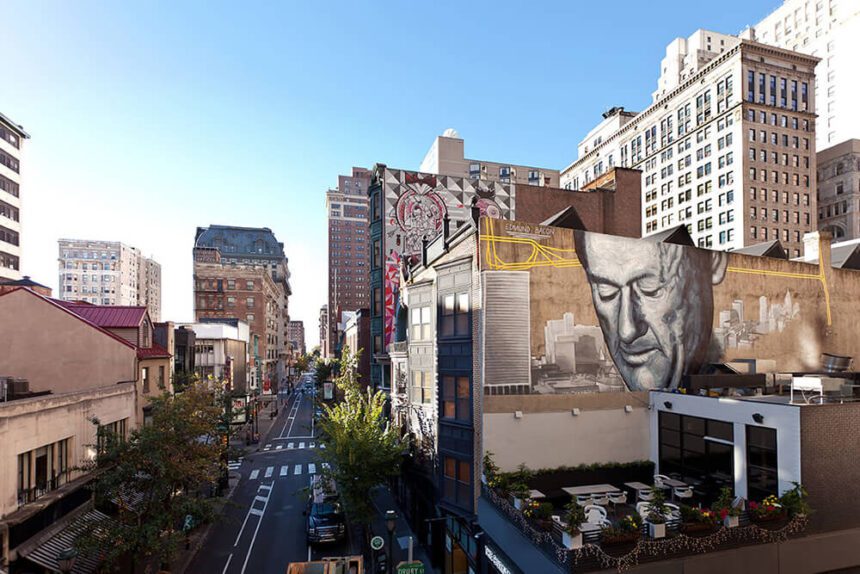
The Father of Modern Philadelphia © 2012 City of Philadelphia Mural Arts Program / Gaia, 1300 Drury Street. Photo by S. Weinik.
2. Curtis Institute of Music
The renowned Curtis Institute of Music offers free admission to their student recital series. Enjoy concerts by some of the most talented young musicians in the world in a historical and inspiring setting. Purchased tickets are required for other performances at the Curtis.
3. Taller Puertorriqueño
Located in the El Centro de Oro neighborhood, Taller Puertorriqueño serves as a multifunctional hub, offering an art gallery, event space, and community center. They host various Puerto Rican events such as symposia, artist workshops, and film screenings.
4. The Rocky Steps & Parkway Art Museums
Follow in the steps of Rocky Balboa with a jog up the Rocky Steps to the Philadelphia Museum of Art. And don’t forget to take your photo with Rocky’s statue once you’ve cooled down. The museum has a “pay what you wish” offer on the first Sunday of every month and each Friday after 5 p.m. The Barnes Foundation, a short walk from the Philadelphia Museum of Art, also offers free admission on the first Sunday of the month.
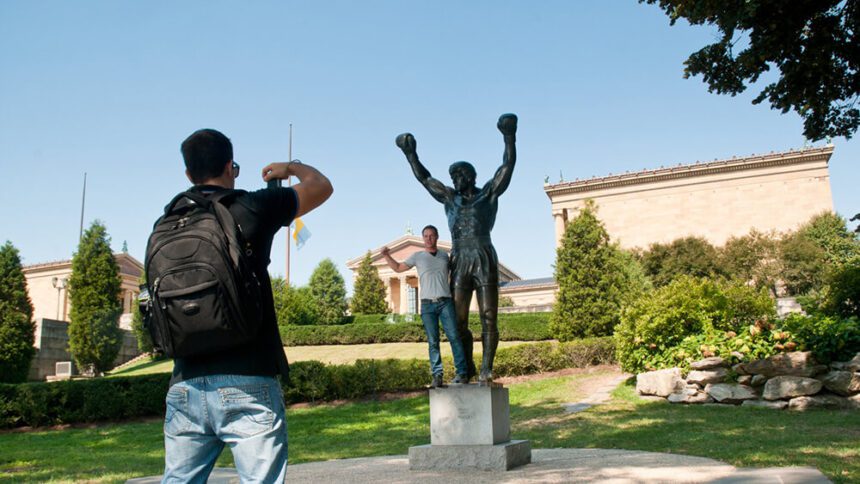
Grab a photo with the iconic Rocky statue at the base of the Philadelphia Museum of Art’s eastern steps. Photo by bklphoto.com for PHLCVB.
5. Free Galleries and Museums in Center City
Visit the Fabric Workshop & Museum, a free, contemporary art museum across from the Pennsylvania Convention Center. A short walk from The Fabric Workshop & Museum is the Galleries at Moore College of Art and Design. The Galleries feature the work of significant regional, national, and international artists with distinctive exhibitions and educational programs.
6. The Universal Sphere™ at the Comcast Technology Center
Free Science Attractions in Philadelphia
As a prominent center for life sciences, the city offers free admission to an array of must-visit museums and experiences.
1. Science History Institute
The Science History Institute offers free admission and has an outstanding collection of chemistry-related objects, artwork, photographs, and books. Its exhibitions illustrate the impact chemistry and chemistry engineering have had on the modern world.
2. Wagner Free Institute of Science
Founded in 1855, the Wagner Free Institute of Science provides free public education in science. The National Historic Landmark building houses more than 100,000 natural history specimens including fossils, shells, minerals, and mounted animal skeletons.
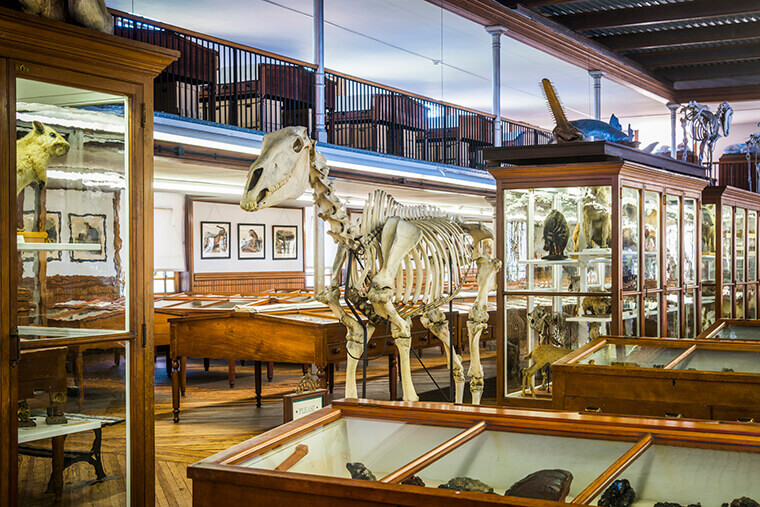
More than 100,000 natural history specimens can be found within the Wagner Free Institute of Science in North Philadelphia. Photo by R. Cardillo.
3. Pennsylvania Hospital
Pennsylvania Hospital, the nation’s first hospital, was founded in 1751 by Benjamin Franklin and Dr. Thomas Bond. Take a free tour of the historic Pine Building with stops at a 13,000-volume library and the first surgical amphitheater in the country. Guests can also stroll through the beautiful herb gardens and grounds outside. For guided tours, contact the Pine Building at least 48 hours in advance.
4. Fairmount Water Works
Built in the 1800s as Philadelphia’s sole water pumping station, the Fairmount Water Works is situated between Boathouse Row and the Philadelphia Museum of Art on the east bank of the Schuylkill River. Today, the Fairmount Water Works serves as a museum that educates visitors on the importance of water preservation in our daily lives.
Complete your Philadelphia itinerary by exploring where to eat and stay on our discover page. Select your favorites to create your own unique Philadelphia experience.
